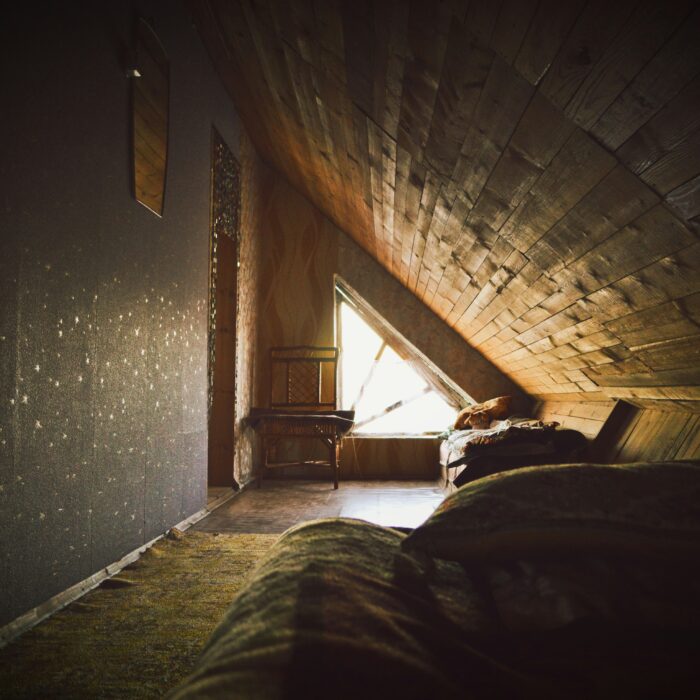You have no items in your cart. Want to get some nice things?
Go shopping
Check. Can you hear me? All right… The plaster is splitting. Fragments of molding fall as a headboard beats against the other side of the wall — stapled Naugahyde on cracked wood — resting my finger against random keys of my typewriter, just sufficient to watch the striker rear up like a polished cobra, only to recoil into a reverie of the woven waste basket. They’re sniffing glue, and I can hear strange tongues corkscrewing from their fevered bodies. Been like this every night since I got the assignment and I have finally given them names: Looba and Titus. I wish that Titus could get his rocks off inside an hour like a damn human being. Looba is patient, reaches for the glue bag and fakes another orgasm. The whole structure of the motel resounds with it; it’s like shaking a homunculus in a snare drum, an eerie, vengeful sound of an unformed man beating against walls of skin. Even from the electrical sockets the buzz and scrape of danger come in sparks, rumors spitting through the sheet rock. Someone else puts twenty-five cents in their bedside slot — sound like a Chinese laundry in the far future — Whimpers slop from the lint-fuzzed vents. The place has all the tacky translucence of a beehive, but none of the privacy. The sky hangs over Memphis like a clenched fist. I do not belong here. I might have belonged here. According to this damp matchbook, the motel is known as The Palace — squelch —
Three hours later, I return from St. Joseph’s. Are you listening? One. Two. Fucking needles are barely moving. Let me play this back — squelch — Closing the door to my room, the silence informs me that Looba and Titus must have checked out, perhaps literally. The hospital smell pours out of my jacket as I remove it, laying it on the flat chartreuse bedspread… The atmosphere of a hospital, like no other place, defies nostalgia — that blank bleach smell, an insipid greenish fog. I think of re-opening the door that leads to the apron of The Palace’s parking lot and admitting the smell of the rain as it begins to fall, but I am — frankly — afraid. The lightning advancing between the streetlights reminds me of the malice of strangers, the swift antipathies of the slum. I should not have come back to Memphis — I did not need the commission. Could the magazine not find a real hotel, closer to the hospital, for their godforsaken assignment? The typewriter makes a terrible exaggerated noise: a whip cracking between the storm light beyond the blinds and the turbid shadows of my room. I don’t want to draw attention to myself. I want to work on anything instead of this, but I’m running up against a deadline: The difference between what I am and what I want to be. I move the lamp closer, trying to stabilize the pulsing of the evening. It reaches the limit of its cord beside my elbow on the small table.
When they yanked the not-so-proverbial plug this evening of July 4, 1976 — as I begin — the Reverend Doctor Martin Luther King had been in a coma for eight years. Although, as is well-known by now, I was suspicious and publicly critical of King’s communist insinuations and the raunchy hump of his rhetoric, God knows that I could not entirely sequester my sympathy when witnessing him lain out like the embalmed Lenin in that hospital bed for so many years. It was pathetic. His coma, his death-in-life, or life-in-death — I was never certain which — had become another pitiable spectacle stamped into our consciences by the brown goosestep of technology… We permit medicine liberties that make us shudder in the prisons of our skin… Watching him so imprisoned in plastic and cables, I tried to inhabit the moment in which humanity ceased asking can we keep him alive, and was left with the Devil’s bargain should we keep him alive; and then must we? Ethics — one felt — had faltered, somewhere in the cryogenic blizzard that kept the Reverend Doctor Martin Luther King frozen, palpable. For an hour, I loitered in that antiseptic igloo of a Memphis hospital. It was the coldest spot of the whole haunted city. I watched him while he slept, wondering what on earth any journalist could bring to this scene worthy of either subject or reader. The bullet wound in his cheek had healed into a pale puckered scar. Ray had given the lie to the notion that there is any point in continuing to turn one’s cheek in the face of abject psychopathology. Here, pacifism had its practical limits. The magazine would not print that — Maybe I should send it to Mencken at the Mercury? He’d take it. — But I was not yet willing to put my hand upon my heart and declare the nation to be sick beyond redemption, and I suspected that the Reverend Doctor would agree. Watching his coma, I remembered my congestion, and something like grief in my vocal cords. His shrouded form was interrupted by gleaming plastic tubes, and attended by dormant machines. Apart from King, I was otherwise alone. There was no need to bring a photographer, since there were enough photographs of King’s strange sleep already to make the library at Alexandria groan. The nurses were bored with their charge. They had forgotten how the man with the puckered cheek had come to be there. An assassination is not felt so keenly when it occurs in slow motion, over the worse part of a decade — For Christ’s sake, Looba and Titus are back… — squelch —
It took me an hour to summon the courage to smack my knuckles on their orange door, the geometric purple and mustard hallway carpet mushing my shoes, an empty nail hole where the room number had been. I heard the safety chain, before Titus pulled the door open, a plastic bag of mercurial goo clutched in his hand like a glittering compress. “King is dead.” — “Mother-fucker…” — “Can I come inside?” — “Why?” — “I don’t know…” — “Okay, brother. Come. Come on in…” Looba was cross-legged on the vibrating bed, a young woman carved out of resin, a natural, her white underwear making no imprint on her dark skin. The floor was littered with unfinished models of fighter planes: the fuselage of a Curtiss P-40; a Douglas dive-bomber; a crushed Messerschmitt; a locust floor of wings and props. Empty tubes surrounded the bed. Titus said “Where you from?” — “Harlem. You?” — “I don’t remember.” He spoke impatiently, hurrying through the exertion like doing a push up too fast, to fake talent. Titus was thin, but handsome, even through his muzzle of huffing scabs. “The nurse who switched him off, was she white, or black?” — “Does it matter?” — “Damn straight it matters.” He scuffed a shattered Zero across the carpet. I sat down on the tangled corner of the bed, smoothing the gulf of red blanket between Looba and me. She didn’t move. “I wasn’t there,” I said, pulling the plastic solvent bag from Titus’ sweat-backed hands. “But I was there when he got shot.” I sucked the last breath out of that artificial lung, drifted through the puckering plastic toward that place where Looba waited for me in her coma — and the glistening snakes of toluene — squelch —
Microphone test. Three. Four. Do you read me? Suspended animation — empathy — how do you maintain another man in your mind? I never should have relinquished King from the life-support of my imagination. Red vines slither over the city, clawing out of exploded manhole covers, uncoiling from the bloody sunset, spooling ceaselessly from the motel. Looba pushes dimes into the bed and I come inside her, dropping in spent jolts of time. Crawling toward the smashed television, Titus glues a tiny black figurine into President Robert Kennedy’s red Chevrolet, as scarlet tentacles rip towers of flame out of gas stations and mangle telephone lines. Blood runs from the cathode ray tube. Standing with Looba on an overgrown balcony, surveying the fuming jungle and the searchlights from the Hueys, the wind pours through the hole in my cheek — frostbite in the cavity of a blown molar.

jamesreich
James Reich is the author of the novels BOMBSHELL (July 2013) and I, JUDAS (October 2011) published by Soft Skull Press. He is a member of PEN American Center, and the International Association of Crime Writers: North America. James is a regular contributor to Bold Type Magazine, The Rumpus, The Nervous Breakdown, Sensitive Skin, International Times, Headzine, Sleeping Fish, and others. Since 2011, he has been a Creative Writing and Literature faculty member at Santa Fe University of Art and Design. James has been commissioned to write an introduction to Barry Malzberg’s award-winning science fiction novel Beyond Apollo, being reissued in 2015. He was born in England, and has been resident in the US since 2009.




